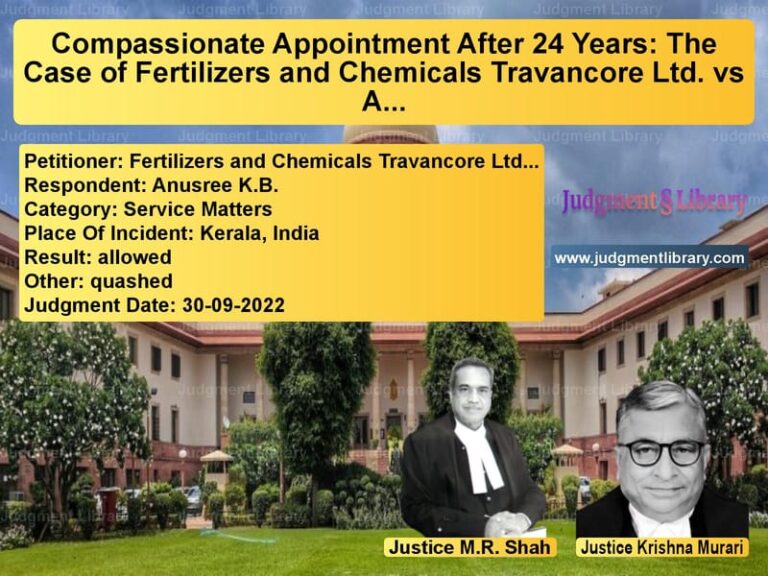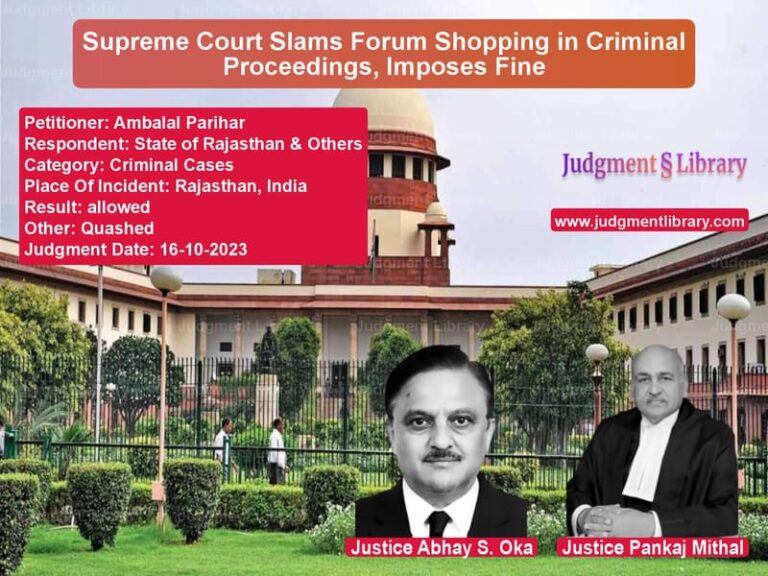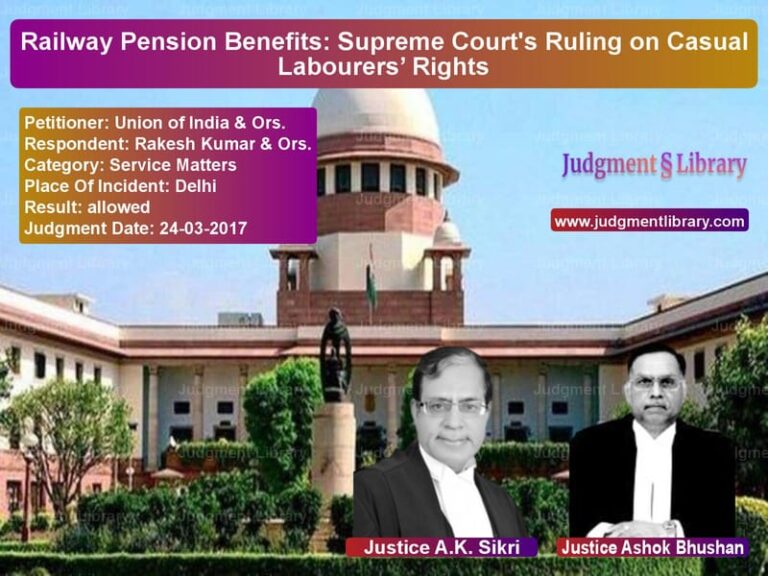Legal Heirship and Property Partition: Supreme Court Restores Daughter’s Rights in Ancestral Property
The Supreme Court of India recently delivered a landmark judgment in the case of Somakka (Dead) By LRs. v. K.P. Basavaraj (Dead) By LRs.. The case revolved around the partition of ancestral property between a brother and sister and the validity of occupancy rights over inherited land. This decision reinforced the legal framework governing succession and property division among legal heirs, emphasizing that ancestral properties should be equally divided among all eligible successors.
The dispute arose when the appellant, Somakka, sought partition and separate possession of her share in ancestral properties inherited from her father, along with specific performance of a sale agreement for another property. The High Court, in its ruling, reduced her share in one of the properties. Aggrieved by this, the appellant approached the Supreme Court, which ultimately ruled in her favor, restoring her rightful share.
Background of the Case
The appellant, Somakka, and the respondent, K.P. Basavaraj, were siblings. Their father, Puttanna, had inherited and acquired various properties during his lifetime. The properties in question were divided into two categories:
- Schedule ‘A’ properties: Consisting of ancestral land inherited by Puttanna.
- Schedule ‘B’ property: A separate property that the appellant claimed to have purchased through a sale agreement.
The appellant sought partition and separate possession of her share in Schedule ‘A’ properties and specific performance of the agreement concerning Schedule ‘B’ property. She argued that she was entitled to a one-fourth share in items 1 and 2 of Schedule ‘A’ and a one-half share in item 3, as it was her father’s self-acquired property.
Petitioner’s Arguments
The appellant contended that:
- Items 1 and 2 of Schedule ‘A’ were ancestral properties inherited by their father, and upon his death, she was entitled to a one-fourth share.
- Item 3 of Schedule ‘A’ was self-acquired by their father through occupancy rights under the Mysore (Religious and Charitable) Inams Abolition Act, 1955. She argued that she should receive one-half share of this property.
- She had paid Rs. 12,000 for purchasing a portion of the Schedule ‘B’ property and had taken possession based on an agreement dated May 25, 1981.
- Her brother, the respondent, refused to execute the sale deed for Schedule ‘B’ property despite her willingness to fulfill her obligations.
Respondent’s Arguments
The respondent countered by asserting:
- That their father had already spent a substantial sum on the appellant’s marriage and had provided her with financial assistance.
- That the appellant had secretly used family savings to purchase properties in her husband’s name.
- That item 3 of Schedule ‘A’ property was cultivated jointly by their father and the respondent, making it a joint family property rather than a self-acquired property of their father.
- That the sale agreement for Schedule ‘B’ property was fraudulent and fabricated, and he had never received the consideration amount.
Key Observations of the Supreme Court
The Supreme Court analyzed the legal and factual aspects of the case, making crucial observations:
“The High Court committed a serious error in neither forming the points for determination nor considering the evidence on record. The judgment of the High Court is thus unsustainable in law and liable to be set aside.”
The Court emphasized that:
- Items 1 and 2 of Schedule ‘A’ were undeniably ancestral properties, and the appellant’s one-fourth share in them was correctly decreed by the lower courts.
- Item 3 of Schedule ‘A’ was granted to their father under the Inams Abolition Act and was therefore self-acquired property. Upon his death, it was inherited by both legal heirs.
- The Trial Court correctly ruled that the appellant was entitled to a one-half share in item 3, but the High Court erred by reducing it to one-fourth.
- The High Court’s failure to examine the evidence on record before modifying the Trial Court’s decree was a major procedural lapse.
Final Judgment and Directions
The Supreme Court ruled in favor of the appellant, making the following key pronouncements:
- The judgment of the High Court was set aside, and the ruling of the Trial Court was restored.
- The appellant was confirmed to have a one-fourth share in items 1 and 2 of Schedule ‘A’.
- Her share in item 3 of Schedule ‘A’ was reinstated to one-half, as decreed by the Trial Court.
- The case was not remanded to the High Court due to its lengthy litigation history and the clear evidence supporting the appellant’s claim.
- The Trial Court was directed to proceed with the final decree of partition based on the judgment.
Conclusion
This Supreme Court ruling reaffirms the legal principles governing inheritance, self-acquired property, and partition rights. It establishes that ancestral property must be divided among all eligible heirs and that a legal heir cannot be deprived of their rightful share based on arbitrary modifications in appellate decisions.
Furthermore, the Court’s decision underscores the importance of adhering to procedural fairness in appellate proceedings. By setting aside the High Court’s ruling, the Supreme Court has reinforced that appellate courts must thoroughly evaluate evidence before altering lower court decrees.
Read also: https://judgmentlibrary.com/supreme-court-clarifies-compensation-under-land-acquisition-laws/
This judgment is a significant step toward ensuring gender equality in property inheritance and serves as an important precedent for future disputes over ancestral and self-acquired properties.
Petitioner Name: Somakka (Dead) By LRs..Respondent Name: K.P. Basavaraj (Dead) By LRs..Judgment By: Justice S. Abdul Nazeer, Justice Vikram Nath.Place Of Incident: Bangalore, Karnataka.Judgment Date: 13-06-2022.
Don’t miss out on the full details! Download the complete judgment in PDF format below and gain valuable insights instantly!
Download Judgment: somakka-(dead)-by-lr-vs-k.p.-basavaraj-(dead-supreme-court-of-india-judgment-dated-13-06-2022.pdf
Directly Download Judgment: Directly download this Judgment
See all petitions in Property Disputes
See all petitions in Succession and Wills
See all petitions in Judgment by S. Abdul Nazeer
See all petitions in Judgment by Vikram Nath
See all petitions in allowed
See all petitions in Modified
See all petitions in supreme court of India judgments June 2022
See all petitions in 2022 judgments
See all posts in Civil Cases Category
See all allowed petitions in Civil Cases Category
See all Dismissed petitions in Civil Cases Category
See all partially allowed petitions in Civil Cases Category







